- Home
- Naguib Mahfouz
Midaq Alley Page 6
Midaq Alley Read online
Page 6
What, then, did she want? And who would satisfy her if this kind young man did not? She knew no answer to this, and she attributed her indifference to his poverty. It was a fact that her love to dominate was a result of her love to quarrel, not the reverse. She had always resisted peace and quiet and found no joy in easy victory. Thus her confused feelings filled her with perplexity and distress.
Abbas refrained from following her, fearing that he might be seen. He started back home, his heart overflowing with disappointment, but not despair.
He told himself as he made his way slowly, oblivious to all about him, that she had at least spoken to him, and at some length too. If she had wanted to stop him, she could easily have done so.
It was obvious she did not dislike him and perhaps she was acting like any girl would. It could have been modesty that made her hesitate to make friends with him. He felt drunk with joy from some magic potion he had never before tasted. Abbas was truly in love and he felt certain his love for her would last a thousand years.
Consequently he felt no sense of failure from today’s encounter. When he turned into Sanadiqiya, he saw Sheikh Darwish coming from the mosque of Hussian. They met at the end of the alley and Abbas moved to greet him. The old man, however, pointed his forefinger at him warningly and, gazing from behind his gold-rimmed spectacles, he said, “Never go out without a hat! I warn you against going bareheaded in weather like this, in a world like this. Young men’s brains are liable to dissolve into steam and fly off. This situation is well known in alma’sah and the meaning of this in English is tragedy and it is spelled t-r-a-g-e-d-y…”
Mr. Kirsha, the café owner, was occupied with an important matter; indeed, rarely did a year go by without his involvement in similar matters, in spite of the trouble they caused him. The hashish robbed him of any will to resist. He was a poor man, however, unlike the majority of café proprietors, not because his business was unprofitable, but because he was a squanderer, wasting his profits and throwing his money about with nothing to show for it. In fact, he gave free rein to his desires and passions and especially to that one unwholesome weakness of his.
When the sun was nearly set, he left his café without telling Sanker of his intention. Dressed in his black cloak and leaning on his old stick, he moved slowly and heavily. His gloomy eyes, almost hidden beneath heavy lids, scarcely allowed him to see his course. His heart was throbbing violently. Strange as it seems, Mr. Kirsha had always lived a most irregular life, and he had rolled in its dirt so long that it appeared to him a perfectly normal one.
He was a narcotics peddler and accustomed to doing his business under a veil of darkness. Normal life had eluded him and he had become a prey to perversions. Thus his submission to his vices was complete; he neither regretted them nor was he repentant. He would complain about the government for punishing people like himself and would slander those who openly despised and scorned his other passion. He always said of the government, “It has legalized wine, which God forbade, and has forbidden hashish, which God allowed. It protects hot and stuffy taverns while it suppresses hashish dens which supply medicine for both the soul and the intellect.” He frequently shook his head sadly and said, “What’s wrong with hashish? It gives peace to the mind and comfort to life and apart from both these facts, it is an excellent aphrodisiac!”
Concerning his “other vice,” he would say in his customary way, “You have your religion, I have mine!” Nevertheless, the frequency with which he indulged in his passions did not prevent his heart from throbbing violently when he arrived on the brink of each new erotic adventure.
He went slowly down Ghouriya, allowing his thoughts to wander and asking himself, his heart filled with hope, “What will the evening bring me, I wonder?” In spite of his absorption in his thoughts, he was conscious of the shops on both sides and from time to time he returned the greetings of some of the shopkeepers he knew. He mistrusted such greetings, for he never knew whether they were merely greetings or whether they had some sly and derogatory meaning behind them. People wouldn’t live and let live and were always only to ready to slander with their avid and greedy mouths. They were forever talking about him, and what good did their defamation do? None at all! It was as though he enjoyed their criticism and he continued doing as he wished.
He continued until he came up to the last shop on his left, close to al-Azhar. Now his heart beat faster still and he forgot the greetings of people and the unpleasant thoughts they inspired, while a faint glint of evil seemed to issue from his dim eyes. He was now near the shop, his mouth gaping and his lips drooping as he crossed its threshold.
It was a small shop, with an old man sitting in the center behind a little desk. Leaning against one of the shop’s shelves, piled high with goods, was a youthful-looking lad who was the shop’s salesman. As soon as he saw the customer he stood up straight, smiling as an alert salesman should. Kirsha’s heavy brows rose and his eyes settled on the youth; then he greeted him gently. The youth returned his greeting in a friendly fashion and suddenly realized that this was the third time in three successive days that he had seen this man. He asked himself why the man had not bought what he wanted all at the same time.
Mr. Kirsha said, “Show me what socks you have…”
The youth brought out several types and spread them on the counter. Kirsha examined them, looking surreptitiously at the boy’s face as he did so. The youth did not shy away from him and a faint smile crossed Kirsha’s lips. He dragged out his examination as long as he politely could, then he spoke quietly. “Don’t be angry at me, my boy, my eyesight is weak. Now, you choose a pair for me which appeals to your good taste…”
He was silent a moment, gazing intently into his face. Then he went on, a smile on his drooping lips: “Just like your handsome face…”
The good-looking boy showed him another pair, pretending to ignore the compliment. Kirsha said, “Wrap up six pairs for me.”
He waited while the lad wrapped the socks, then he suggested, “You had better wrap up a dozen. I am not short of money, praise God.”
The youth silently did as requested and muttered, as he handed him the parcel, “You have made a good buy.”
Mr. Kirsha smiled, or rather his mouth split open mechanically; this was accompanied by a slight twitching of his eyebrows. He said mischievously, “Thanks to you, my boy,” and then quietly: “Praise be to God.”
Kirsha, having paid for his parcel, left the shop just as excited as he had been when he entered. He turned toward Azhar Street, crossed slowly to its opposite side, and stopped in the shade of a tree. Standing with one hand on his stick and the other gripping his package, he kept his eyes fixed on the shop a fair distance away. The lad, his arms crossed on his chest, was now standing in the same position as when Kirsha entered the shop.
Kirsha gazed toward him, only able to make out a dim picture of the boy, but his memory and his imagination supplied what his weak sight could not distinguish. He told himself, “He knew what I meant, for sure.” Then he recalled how gentle, humble, and well mannered he was and his ears recalled his voice as he had said, “You have made a good buy.” Kirsha’s heart froze in excitement at the thought and he sighed from deep within him.
He remained standing in his place for some time, burning with apprehension and excitement, until at last he saw the shop close its doors. When this was done, the old shopkeeper and the lad parted, the former going off toward the gold market and the lad moving toward Azhar Street. Slowly Kirsha left his tree and walked in the direction taken by the youth. The boy saw him when he had crossed two-thirds of the street but showed no concern or interest and was about to pass him by without more ado when Kirsha came up to him and said politely, “Good evening, my boy.”
The lad looked at him, his eyes giving a suggestion of a faint smile, and mumbled, “Good evening, sir.”
Kirsha, forcing conversation, continued: “Have you locked up the shop?”
The boy noticed that he was holding back, as
though inviting him to slow down, but he continued his pace and said, “Yes, sir.”
Kirsha was forced to quicken his pace and they walked together on the pavement, the café owner never taking his eyes off the boy. He remarked, “Your working hours are long, may God help you!”
The boy sighed and replied, “What’s the alternative? If you want to eat, you must tire yourself out…”
Kirsha was delighted that the lad was conversing with him and sensed that his friendliness was an auspicious sign. He exclaimed, “May God reward you for your exertions, my boy…”
“Thank you, sir.”
The café owner went on indignantly: “Life’s really one long trial, but it’s very rare that one’s exertions receive the reward they deserve. What a vast number of exploited working people there are in this world.”
This statement struck a responsive chord in the boy and with conviction he agreed. “You are right, sir. What a lot of exploited workers there are in this world.”
“Patience is the key to joy. Yes, what a lot of people are exploited and what this means in simple terms is that there are a great number of exploiters. However, by the graciousness of God, the world’s not entirely devoid of merciful people, all the same…”
“Where are these merciful people?”
He almost answered, “I am one of them myself,” but he stopped himself and said reprovingly, “Don’t be slanderous, my boy. All is well with Muhammad’s people.” Then he changed his tone and asked, “Why are you going so fast? Are you in a hurry?”
“I must go home to change my clothes.”
Kirsha asked him with interest, “And after that?”
“I go off to the café.”
“Which one?”
“The Ramadan café.”
At this Kirsha’s smile was so broad that his gold teeth gleamed in the dark and he said temptingly, “Why don’t you honor our café?”
“Which one is that, sir?”
Kirsha’s voice went hoarse as he replied, “Kirsha’s café in Midaq Alley. I am Mr. Kirsha myself.”
Much impressed, the lad commented, “I am honored, sir. That is a very well-known café…”
“Will you come?”
“If God wishes.”
Kirsha, with patience, commented, “Everything is dependent on God’s wishes. But do you really intend to come or are you just saying that to evade me?”
The boy laughed quietly and said, “No, I really intend to come.”
“Tonight, then!”
When the lad made no reply, Kirsha said emphatically, his heart dancing with delight, “Without fail…”
The boy muttered, “With God’s permission…”
Kirsha sighed audibly and asked, “Where do you live?”
“Wikala Lane.”
“We are almost neighbors. Are you married?”
“Of course not…I am with my family.”
Kirsha commented politely, “You seem to come from a good family. I can tell. A good jug pours forth good water. You must take great care to look after your future. You must not remain a shop salesman all your life.”
A look of anxiety crossed the boy’s handsome face as he asked, “Can someone like me hope for anything better?”
“Have ‘we’ run out of ideas?” asked Kirsha scornfully. “Weren’t all big men once small?”
“Oh yes, but it’s not inevitable that small men become big.”
Finishing the boy’s statement, Kirsha added, “Unless he has some luck! Let’s remember today, the day when we got acquainted, as a day of great good fortune. Shall I expect you tonight?”
The boy hesitated a moment, then said, smiling, “Only a fool refuses generosity!”
They shook hands at Mutawaly Gate and Kirsha made his way back, stumbling in the dark. The absentminded café owner was now fully awake and a warm feeling of happiness ran through him. As he passed the closed shop, he gazed at it with passionate longing. He came back at last to the alley, its shops bolted and enveloped in darkness, except for the one light coming from the café
In contrast to the cold outside air, the air in the café was warm from the heat of the pipe smoke, the breath of the people sitting within it, and the glowing stove. The men sat around on sofas talking and sipping coffee, while the stomach of the radio belched forth its clamor. Everyone ignored it, as if it were a boring speaker addressing the deaf. Sanker was bustling with activity, never still and incessantly shouting. Kirsha made his way quietly to his seat behind the till, avoiding the customers’ glances. Just at that moment Uncle Kamil was asking friends to persuade Abbas to give up the shroud he was holding for him, but they all agreed to refuse his request.
Dr. Booshy spoke to Kamil. “Don’t worry about the clothing of the next world. A man spends much of his time on earth naked, but he can’t cross the threshold of the grave naked, no matter how poor he may be.”
The simplehearted Kamil repeated his request and was repeatedly refused and ridiculed, until at last he remained silent in defeat. Abbas told his friends of his decision to work for the British Army. He listened to their comments and advice as they all approved of his plan and wished him good fortune and wealth.
Radwan Hussainy was engaged in one of his long conversations filled with exhortation and advice. He turned to the man talking with him and said, “Never say you are bored. Boredom is disbelief in God. Boredom is an illness that destroys faith. Does it mean anything other than dissatisfaction with life? Life is a blessed gift from God Almighty, so how can a believer become bored or dissatisfied with it? You say you are dissatisfied with this or that, and I ask you from where did this or that originate? Doesn’t everything originate with the Glorious God who in His kindness rights all wrongs? Never rebel against the work of the Creator! All of life has beauty and taste, although the bitterness of an evil soul will pollute the most appetizing tastes. Believe me, pain brings joy, despair has its pleasure, and death teaches a lesson. How can we be bored when the sky is blue, the earth green, and the flowers fragrant? How can we be depressed when hearts have a capacity for love and our souls have the power of faith? Seek refuge from the devil in God and never say you are bored…”
He took a sip from his cinnamon-flavored tea and then added as though expressing the doubts of his own conscience, “As for life’s tragedies, our love will defeat them. Love is the most effective cure. In the crevices of disasters, happiness lies like a diamond in a mine, so let us instill in ourselves the wisdom of love.”
His pinkish-red face glowed with benevolence and light, his reddish beard framing it like a halo around the moon. In comparison with his own towering tranquillity, all about him seemed chaos and confusion. His expression was all purity and it spoke of his faith, love, and aloofness from personal ambitions.
It was said of him that he lost his dignity the day he failed his examinations at al-Azhar University and that he despaired of immortality when he lost his children; thus, he found compensation for his losses by winning people’s hearts with his love and generosity. No one doubted that he was sincere in his faith, in his love, and in his kindness. It was remarkable, however, that this gentle man was harsh and uncompromising in his own house. Some thought that, having despaired of any authority on earth, Hussainy imposed his influence on the only person who would submit to his will—his wife. Thus he satisfied his greed for power by inflicting tyranny on her.
However, we must not underestimate the power of the traditions of the time and the place. We must not forget that among this class the prevailing opinion was that women were best treated as children, above all for the sake of their own happiness. His wife, nevertheless, had nothing to complain of in his treatment of her. Apart from those wounds indelibly engraved on her heart by the deaths of her children, she considered herself a fortunate woman, proud of her husband and of her life.
Kirsha was both present and absent at the same time. Sitting gave him no peace for a single minute; he suffered the bitterness of victory in spiritless silence. Every
few minutes he peered toward the alley entrance. He stared at the till, patient, motionless, and telling himself, “He will surely come. He will come just as those before him did.”
He seemed to see the boy’s face and looked toward the chair standing between him and Darwish’s sofa and in his mind’s eye saw the boy putting his trust in him. In times gone by he would never have invited such a boy to his café, but now his vice was well known to the alley inhabitants. Now Kirsha’s mask was removed and he indulged his perversion openly. Raging scenes took place between him and his wife, providing rich gossip for people like Dr. Booshy and Umm Hamida. However, he did not care at all. The flames of one scandal scarcely died down before he would delight them with the fuel of other misdemeanors; it was as though he found pleasure in creating scandals. Thus he now sat in apprehension, peace unable to find a path to his tarnished soul. At last Dr. Booshy noticed his anxious state and said to Abbas, “These are the signs of the hour!”
Now Sheikh Darwish emerged from his silence and recited two lines of ancient love poetry, muttering, “Oh, madam, love is worth millions. I have spent, madam, for love of you, a hundred thousand pounds, but this is just a paltry sum!”
—
At last Dr. Booshy saw Kirsha look intently at the entrance to the alley. Suddenly he saw him sit up straight and smile broadly. Booshy looked toward the café door and soon the face of the lad appeared, his innocent eyes gazing hesitantly at the people in the café.
The bakery is next to Kirsha’s café, near Mrs. Saniya Afify’s house. It is an almost square building, its sides built unevenly. An oven occupies the left side and the wall is lined with shelves. Between the oven and the entrance is a bench on which the owners of the bakery, Husniya and her husband, Jaada, sleep. Darkness would envelop the spot day and night were it not for the light issuing from the door of the oven.

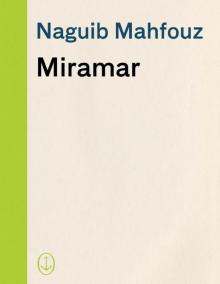 Miramar
Miramar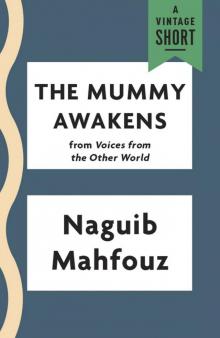 The Mummy Awakens
The Mummy Awakens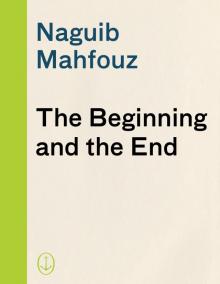 The Beginning and the End
The Beginning and the End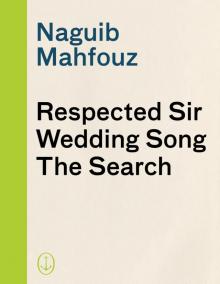 Respected Sir, Wedding Song, the Search
Respected Sir, Wedding Song, the Search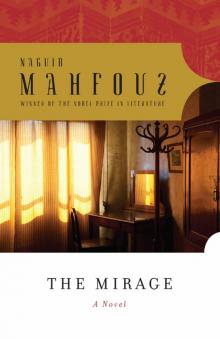 The Mirage
The Mirage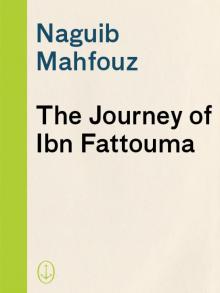 Novels by Naguib Mahfouz
Novels by Naguib Mahfouz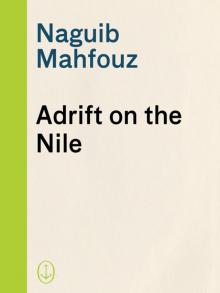 Adrift on the Nile
Adrift on the Nile Karnak Café
Karnak Café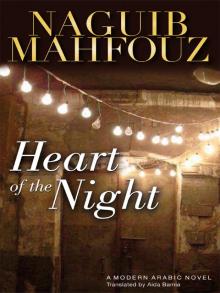 Heart of the Night
Heart of the Night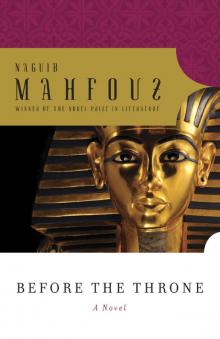 Before the Throne
Before the Throne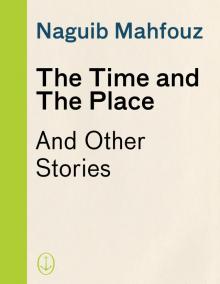 The Time and the Place: And Other Stories
The Time and the Place: And Other Stories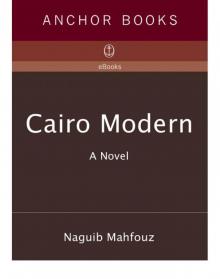 Cairo Modern
Cairo Modern Arabian Nights and Days
Arabian Nights and Days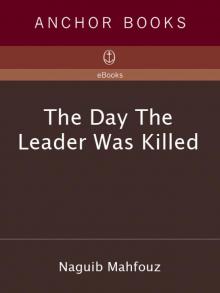 The Day the Leader Was Killed
The Day the Leader Was Killed Morning and Evening Talk
Morning and Evening Talk Three Novels of Ancient Egypt Khufu's Wisdom
Three Novels of Ancient Egypt Khufu's Wisdom Akhenaten: Dweller in Truth
Akhenaten: Dweller in Truth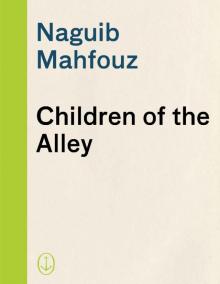 Children of the Alley
Children of the Alley Voices From the Other World
Voices From the Other World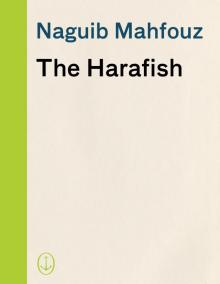 The Harafish
The Harafish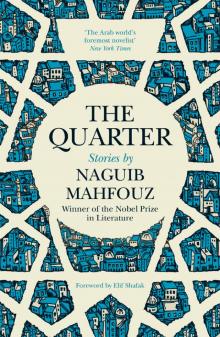 The Quarter
The Quarter The Seventh Heaven: Supernatural Tales
The Seventh Heaven: Supernatural Tales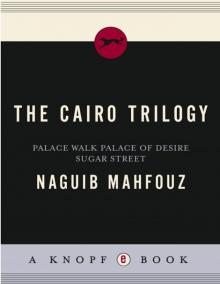 The Cairo Trilogy: Palace Walk, Palace of Desire, Sugar Street
The Cairo Trilogy: Palace Walk, Palace of Desire, Sugar Street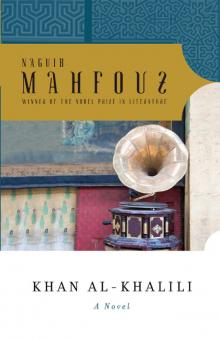 Khan Al-Khalili
Khan Al-Khalili Three Novels of Ancient Egypt Khufu's Wisdom, Rhadopis of Nubia, Thebes at War
Three Novels of Ancient Egypt Khufu's Wisdom, Rhadopis of Nubia, Thebes at War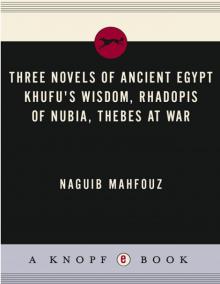 Three Novels of Ancient Egypt
Three Novels of Ancient Egypt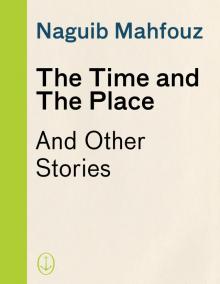 The Time and the Place
The Time and the Place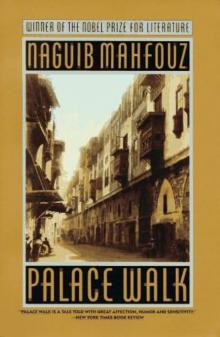 Palace Walk tct-1
Palace Walk tct-1 Akhenaten
Akhenaten The Seventh Heaven
The Seventh Heaven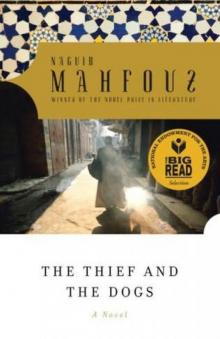 The Thief and the Dogs
The Thief and the Dogs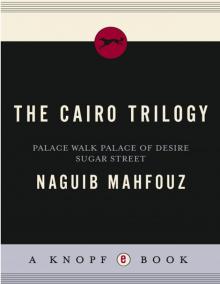 The Cairo Trilogy
The Cairo Trilogy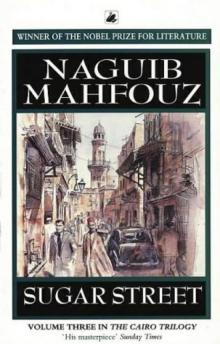 Sugar Street tct-3
Sugar Street tct-3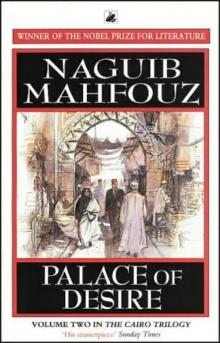 Palace of Desire tct-2
Palace of Desire tct-2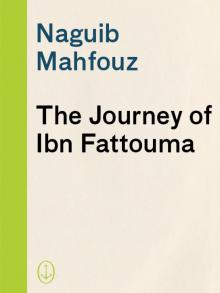 The Journey of Ibn Fattouma
The Journey of Ibn Fattouma